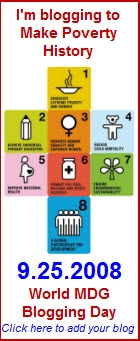MDG Blogging Day - Write your Representative/Senators
From EPPN:
Newer Post
This week, world leaders are gathering in New York to review progress toward the Millennium Development Goals, the commitments shared by the United States and other nations for the elimination of deadly global poverty and disease. Over the past decade, American leadership in fighting poverty has saved millions of lives, but a great deal of work remains if we are to keep the promises we’ve made. Times are tight here at home, but fighting poverty and disease abroad is cost-effective and benefits America as well, both economically and in terms of global security. As we approach a new Presidential administration and a new Congress, I urge you and your colleagues to renew your commitment to fighting global poverty and disease in the following three areas highlighted by the Millennium Development Goals:
-- Better, More Effective Foreign Assistance: Foreign-aid programs like U.S. efforts to fight AIDS and malaria, promote micro-credit for women, and empower local communities through the Millennium Challenge Corporation, are saving lives and strengthening communities abroad. These efforts should be expanded to meet rising needs but also sharpened to promote transparency, aid effectiveness, and accountability. In particular, in the coming year, Congress should fully fund current foreign-aid programs that are fighting poverty; and pass legislation to promote universal primary education, improve child-survival rates, promote women’s economic empowerment, and help poor communities adapt to the effects of climate change.
-- Expanded Debt Cancellation: Working with partner nations, the United States has helped relieve multinational debts of a number of countries over the past decade, and in so doing, has allowed countries to empower themselves. For example, Tanzania and Kenya have put millions of children in school with the savings from debt relief, while Mozambique increased childhood vaccinations 80 percent and Cameroon implemented a successful national HIV/AIDS plan. Legislation passed by the House this year and currently pending in the Senate called the Jubilee Act (S. 2166) would – at minimal cost to the United States – begin the process of canceling debts for well-governed poor countries that have not yet benefited under past deals but need debt relief to meet the MDGs. The Senate should pass the Jubilee Act and send it to the President before leaving for the year.
-- Fairer Trade Policies: Free and fair trade is a cornerstone of economic empowerment for poor communities, but the current trade system is heavily weighted toward rich countries, often in ways that also harm struggling families in those rich countries. Some policies, like U.S. agricultural subsidies for rich corporate farms, both weaken struggling American communities and exacerbate suffering and need in poor countries abroad. In the coming year, Congress should work with the new President to promote trade policies that serve human need both in the United States and abroad, and in particular, should begin preparing for the next U.S. farm bill by laying the groundwork for restructuring America’s farm-payment system away from benefiting rich corporate producers.
The past several years have brought the United States unprecedented global challenges, and even as Americans have debated how best to meet those challenges, consensus has developed on Capitol Hill and around kitchen tables that fighting deadly poverty and disease abroad is in the interest of both America and humanity as a whole. As world leaders this week sharpen the call for action in fighting poverty and disease, I urge you and your colleagues in Congress to rise to the challenge once again.
Older Post
Tags: Episcopalians for Global Reconciliation, Episcopalian Public Policy Network, EPPN, MDGs, ONE, & World MDG Blogging Day















